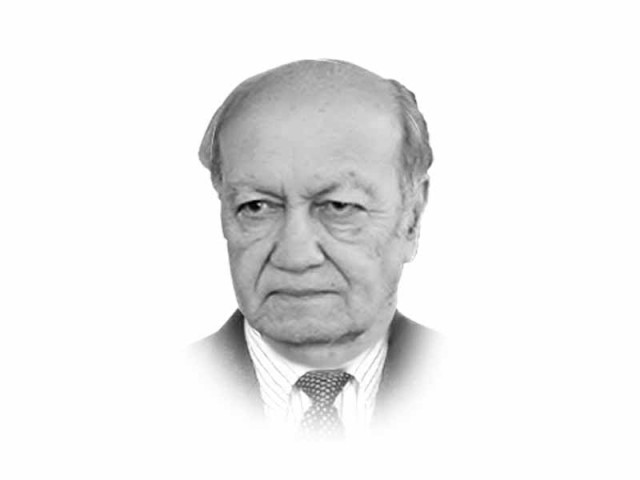Is Pakistan out of the woods?
Imran's attributes of honesty and being single-minded of purpose are assets that Pakistan needs

The writer is a retired lieutenant general of the Pakistan Army and a former federal secretary. He has also served as chairman of the Pakistan Ordnance Factories Board

The courageous leadership displayed by General Raheel Sharif and his team has turned the tables against the militants and they are on the retreat in Fata. Pockets of resistance in North Waziristan, especially in the mountainous Shawal Valley, still exist due to the porous border and it will be a while before complete control is established. What is lacking, however, is the extremely slow return of internally displaced persons and the reassertion of civilian control. The slow follow-up on the restructuring of Fata is a reflection of political inertia and indicates the dominance of the military in civilian affairs. Unless the prime minister does not personally lead in bringing legislative and administrative reforms, Fata will remain grounded in backwardness and military successes achieved so far might end up being reversed.
What is also worrying is the inflated build-up of the military’s image in a society that is in the process of democratic transition. We tend to forget that Pakistan had 46 years of dictatorship or semi-dictatorship compared to merely 21 years of civilian rule. Excessive glorification of any institution has not paid in the past and will not serve any interests in the future either. Achievements speak for themselves as the security situation has changed dramatically. With the passage of each month, incidents of terrorism in Pakistan have been decreasing and the national narrative too has changed accordingly. For years, security remained the central national issue but as the situation has improved, priority has shifted towards the energy sector and the economy. This is a clear validation of the military’s achievements.
The security situation in Balochistan has also clearly improved. Efforts at political reconciliation seem to be slowly showing results as many dissident groups have laid down their arms although the Baloch Liberation Front does continue to strike at political opponents and the Lashkar-e-Jhangvi’s (LeJ) murderous campaign has not stopped. Political parties need to be more proactive and should not leave everything to the military, especially when it comes to leading in matters that fall in the civilian domain.
The law and order situation in Karachi is on the mend and this is owed primarily to the intelligence-based cleansing operation launched by the Rangers. But the PPP’s poor governance and soiled reputation, coupled with the MQM’s reluctance to shed its militant wing remains serious obstacles to good governance and stability in the long term. A political culture based on family orientation and patronage is another obstacle towards making Pakistan a more egalitarian society. Hopefully, widespread education, land reforms and continuity in national and local government elections will facilitate the throwing up of new leadership from the grassroots level.
The prolonged dharna of the PTI was highly detrimental to the evolution of democracy. In order to ward off its onslaught, Nawaz Sharif had to yield additional space to the military in areas of foreign, defence and internal matters. To retrieve lost ground, the PML-N will have to improve performance and gain the confidence of the people. Had Imran Khan pursued parliamentary politics instead of protesting on the streets, he would have served his party’s and the national cause more effectively. He still has time to play a major role at the provincial and national levels. Imran’s attributes of honesty and being single-minded of purpose are assets that the country needs for harnessing clean and competitive politics.
The economy has stabilised, but suffers from structural weaknesses and is heavily dependent on foreign assistance. The tax regime needs a major overhaul. Overall improvement in the political and security situation has given rise to international confidence as the risk factor has reduced. Pakistan’s GDP is projected to reach 4.5 per cent by 2016. However, continued power shortages, weak external demand and a sluggish agriculture sector that grew only by three per cent are impediments to growth.
The construction of the economic corridor linking Kashgar in China to Gwadar is likely to be a transformational project. The Chinese investment of $46 billion is likely to open fresh opportunities and trigger international confidence. The project’s success is closely linked to the security situation in Balochistan and the military is making serious efforts at ensuring this by engaging in dialogue with dissident elements, and where necessary, taking firm military action. There is, however, a need to strengthen political parties in the province and give them a larger say in governance and policy issues. Balochistan’s politics cannot continue to remain securitised.
Pakistan has been under severe criticism for its inaction or even support of militants that were targeting Afghanistan. These accusations seem to be wilting as the military has successfully cleared sanctuaries in Fata occupied by the TTP and other allied foreign and local militant groups. Ironically, the rise of Hindu nationalism in India makes Pakistan look good, but until we seriously tackle Punjab-based militant organisations like the Jamaatud Dawa, the LeJ and the 40-odd other outfits that were recently proscribed, the stigma attached to us will not go away.
The lesson from 68 years of our history clearly indicates that if Pakistan were to succeed as a functioning democracy, there has to be continuity of the election process and strengthening of institutions. This will only be possible if the civilian leadership improves governance, takes interest in parliament and energises state institutions so that informal powers recede into the background.
Published in The Express Tribune, November 11th, 2015.
Like Opinion & Editorial on Facebook, follow @ETOpEd on Twitter to receive all updates on all our daily pieces.















COMMENTS
Comments are moderated and generally will be posted if they are on-topic and not abusive.
For more information, please see our Comments FAQ